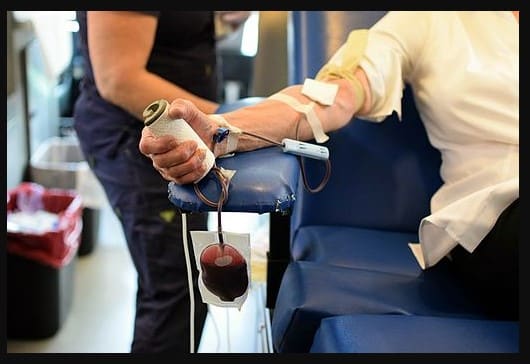Causes.com
| 5.11.23

FDA Ends Ban on Blood Donations From Gay Men
Contact the FDA with your reaction
Updated May 11, 2023
- The FDA announced that it has formally ended the restrictions on blood donations from gay and bisexual men, a denounced and discriminatory ban introduced in the 1980s.
- Instead, the FDA will include a questionnaire for all donors to gain insight into their sexual activity and history. Potential donors could be turned away based on their responses.
- Those taking PrEP to prevent HIV will not be allowed to donate blood, which the agency said was meant to avoid false-negative results during blood screenings.
- The U.S. is still facing a blood shortage, as donations fell during the pandemic and have yet to go back up. The chief executive of America's Blood Centers, Kate Fry, said:
"This shift toward individual donor assessments prioritizes the safety of America's blood supply while treating all donors with the fairness and respect they deserve."
What's the story?
- After years of protests from activists and blood bank workers, the Food and Drug Administration (FDA) has proposed an easing of the restrictions on blood donations from gay and bisexual men who are in monogamous relationships, allowing them to donate blood for the first time since 1985.
What are the new guidelines?
- Under new guidelines announced by the FDA on Friday, gay and bisexual men will no longer have to abstain from sex to donate blood.
- Any individual, regardless of gender or sexual orientation, who has had anal sex with a new partner or multiple partners will have to wait three months before donating blood.
- The FDA’s revised approach focuses less on a person’s sexual identity and more on the sexual behaviors that increase risk of HIV like unsafe sex and multiple partners.
- Canada and the U.K. have made similar changes to their protocols in recent years.
- FDA Commissioner Robert M. Califf said of the decision:
“[D]onating blood is one of several really important symbolic methods of demonstrating one’s caring for other people. We want to make that available to everyone possible in the context of a safe blood supply.”
What were the old guidelines?
- When the AIDS epidemic emerged in the 1980s, thousands of people who had received blood transfusions became infected, triggering stringent FDA rules.
- In 1985 the agency implemented a lifetime ban on blood donations from men who had had sex with another man from 1977 onwards.
- LGBT activists have long urged the FDA to reexamine the restrictions, arguing that they are homophobic and outdated.
How have the guidelines evolved?
- The FDA lifted the lifetime ban in 2015, changing the rules so that men who wanted to donate had to abstain from sex for a year prior to donating blood.
- The deferral period was further reduced to three months in April 2020 as the coronavirus led to national blood shortages.
What prompted the change?
- The American Medical Association and blood banks have argued that the restrictions are not necessarily effective at keeping the blood supply safe.
- Technological advancements and medical improvements have also made the prohibitions outdated. All blood donated in the U.S. is tested for HIV with a nucleic acid test which can detect the virus within 10 to 33 days of infection. The three-month waiting period is an extra precaution.
- The change comes in light of continued blood shortages due to the coronavirus. America’s Blood Centers, a group that operates multiple blood banks in the country, stated that half of their banks have less than two days’ supply of blood rather than the recommended three to five days supply.
What are the criticisms?
- Some activists argue that the waiting period of three months after anal sex still stigmatizes gay men.
- There is no exception to this waiting period, even for men who can present a negative HIV test.
- Anyone taking medications to treat or prevent HIV, including PrEP, would not be eligible to donate, which some activists say is unnecessarily restrictive.
What's next?
- The FDA is expected to adopt the proposal after a period of public comment.
- Newly eligible gay and bisexual donors will likely have to wait until the end of the year while the changes are implemented and finalized.
—Emma Kansiz
(Photo Credit: Vegasjon)
The Latest
-
 Changes are almost here!It's almost time for Causes bold new look—and a bigger mission. We’ve reimagined the experience to better connect people with read more...
Changes are almost here!It's almost time for Causes bold new look—and a bigger mission. We’ve reimagined the experience to better connect people with read more... -
 The Long Arc: Taking Action in Times of Change“Change does not roll in on the wheels of inevitability, but comes through continuous struggle.” Martin Luther King Jr. Today in read more... Advocacy
The Long Arc: Taking Action in Times of Change“Change does not roll in on the wheels of inevitability, but comes through continuous struggle.” Martin Luther King Jr. Today in read more... Advocacy -
 Thousands Displaced as Climate Change Fuels Wildfire Catastrophe in Los AngelesIt's been a week of unprecedented destruction in Los Angeles. So far the Palisades, Eaton and other fires have burned 35,000 read more... Environment
Thousands Displaced as Climate Change Fuels Wildfire Catastrophe in Los AngelesIt's been a week of unprecedented destruction in Los Angeles. So far the Palisades, Eaton and other fires have burned 35,000 read more... Environment -
 Puberty, Privacy, and PolicyOn December 11, the Montana Supreme Court temporarily blocked SB99 , a law that sought to ban gender-affirming care for read more... Families
Puberty, Privacy, and PolicyOn December 11, the Montana Supreme Court temporarily blocked SB99 , a law that sought to ban gender-affirming care for read more... Families
 Climate & Consumption
Climate & Consumption
 Health & Hunger
Health & Hunger
 Politics & Policy
Politics & Policy
 Safety & Security
Safety & Security
